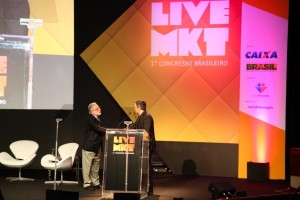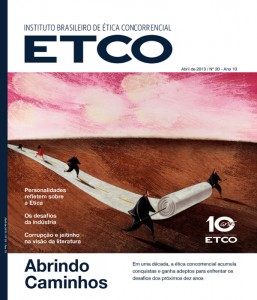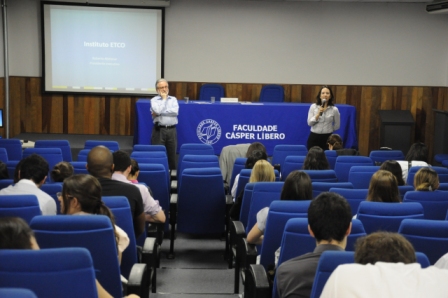Video summarizes the activities developed by ETCO in 2013, in celebration of its first decade of activities.
Video summarizes the activities developed by ETCO in 2013, in celebration of its first decade of activities.

In order to expand the spaces for the discussion on the defense of competitive ethics, the Executive President of ETCO, Roberto Abdenur, accepted an invitation to be one of the speakers at the 1st Brazilian Congress of Live Marketing, promoted by the Promotional Marketing Association (Ampro) on July 29 and 30, in São Paulo.
The event aimed to promote the debate on relevant topics involving agencies, customers, suppliers and the entire production chain of Live Marketing, a concept that values the live experience of a brand.
In his presentation, Abdenur stressed that ethics must be a central value in companies' businesses, both vis-à-vis the internal public, as well as customers and suppliers. “Including ethics as a company value, however, does not authorize it to use it only as a marketing tool. Ethics must be a real commitment of the company. ”
He recalled that the process of building a company's reputation is a long one and that includes ethical behavior, social responsibility and environmental sensitivity.
The ETCO Executive President presented research that shows the complexity of the tax system, impunity and corruption as the main obstacles to be overcome for the establishment of greater ethics in the business environment. Abdenur recalled that, in the Federal Senate, more than 20 senators have lawsuits, while in the Chamber of Deputies the number goes from 100. “The growing indignation about corruption occurs at a stage characterized by important advances in laws and institutions aimed at fighting it, ”said Abdenur, citing, among other measures, the approval of the Anti-Corruption Law.
Live Marketing representatives who participated in the panel following Abdenur's presentation agreed that it is impossible to make this market solid and reliable if companies do not act ethically with customers and suppliers, and also with each other.
“The new element (in business) is transparency. Some companies still practice the idea that in business one always wins and the other loses. But everyone can win, "said the editor-in-chief of the Meio & Mensagem newspaper, Regina Augusto, who concluded by saying that" a sustainable relationship between client and company is possible. "
Itaú's Marketing Director, Fernando Chacon, pointed out that transparency is no longer important only to the public. "We also want a transparent relationship with suppliers," he explained.
Johnson & Johnson's Marketing Director, Andréia Bó, stated that the company has a sustainability relationship with the agencies, that is, its suppliers. "For us, transparency is what governs the process of choosing a partner."
For Marcelo Heidrich, from Ponto de Criação agency, it is necessary to work with transparency and credibility. "This is the time to discuss new relationships, we cannot be wrong with each other because we are doing very well," he said, referring to the need for unity between the agencies in the search for a common goal: ethical business, where everyone is a winner .
 ETCO Magazine - April 2013 / Nº 20 - Year 10
ETCO Magazine - April 2013 / Nº 20 - Year 10
In a decade, competitive ethics accumulates achievements and gains supporters to face the challenges of the next ten years.
Highlights of this edition:
Corruption and knack in the view of literature
Personalities reflect on Ethics
In the name of Brazil: At 10, ETCO leads changes
in the economy and society

The Brazilian Institute of Competitive Ethics (ETCO) presents the Debate Cycle 10 + 10 - retrospective of competitive ethics in Brazil and perspectives for the next decade. In celebration of 10 years of operation, and with the participation of exclusive panelists for each city - Rio de Janeiro, Brasília and São Paulo -, the 10 + 10 Debate Cycle will promote reflection on the progress already achieved and the paths to be followed towards a healthy business environment consistent with the country's economic development.
For the realization of the events, ETCO will count on the partnership of the Federation of Industries of the State of Rio de Janeiro (Firjan), Federation of Industries of the State of São Paulo (Fiesp) and National Confederation of Industry (CNI), whose headquarters will be debates were held. In addition to the invited panelists, the board of directors will be composed by the Executive President of ETCO, Roberto Abdenur, by the Director of Instituto Análise, Alberto Carlos Almeida, and by the Coordinator of the Specialization Course in Tax Law at Fundação Getulio Vargas, professor Eurico Marcos Diniz de Santi .
“We are convinced that, when we take the discussion about competitive ethics to three important centers of political and economic decision in the country, we will be contributing significantly to make the subject increasingly part of the public and private decision-making spheres”, says Abdenur .
Registration for participation in the Debate Cycle 10 + 10 is free and places are limited. To register, simply send an email to eco@sheventos.com.br or call (11) 3814-0414.
Rio de Janeiro Stage
06/06/13 - Firjan | Av. Graça Aranha, nº 1, Rio de Janeiro (RJ)
Guests: Renato Augusto Zagallo Villela dos Santos, Secretary of State for Finance in Rio de Janeiro; Marcelo Moscogliato, Regional Attorney of the Republic, Federal Public Ministry; and Eduardo Eugenio Gouvêa Vieira, President of Firjan.
Brasília Stage
21/08/13 - CNI / SBN, Quadra 01, Bloco C, Ed. Roberto Simonsen, Brasília (DF)
Guests: Luiz Paulo Barreto, Secretary of State for Planning and Budget of the Federal District; Jorge Hage, Minister of State Chief, Comptroller General of the Union; and Jorge Gerdau Johannpeter, Chairman of the Board of Directors of the Gerdau Group.
São Paulo Stage
16/10/13 - Fiesp - Av. Paulista, 1.313, São Paulo (SP)
Guests: Andrea Calabi, São Paulo State Secretary of Finance;
Rodrigo Janot, Deputy Attorney General, Federal Public Ministry; and Fábio Barbosa, President of the Abril Group.
The ETCO Newsletter opens space for an article by Luisa Vasconcelos Araujo * on a topic of great relevance to competitive ethics.
The legislative year started on February 4 with the National Congress pending to analyze difficult issues, capable of redefining the Federation's financial balance and the relationship between States. If, in 2012, parliamentarians faced an environment of intense political conflict, 2013 should not be much different when it comes to discussions about a new federative pact.
Parliamentarians have already started the discussion on the topic, with the change in the Tax Rates on Circulation of Goods (ICMS) for imported products and the institution of a new way of distributing oil royalties. However, other topics of equal relevance were not exhausted in the last legislative session.
Issues that have generated controversy among the federal states concern the government's proposal to unify the ICMS rates at 4%, in addition to the issue of tax incentives granted by the states without approval by the National Council for Farm Policy (Confaz).
The challenge to reduce rates is part of the political agenda of the federal government, which, in order to garner support from political entities around the theme, published on 28/12/2012, Provisional Measure (MPV) 599/2012, which creates a federal compensation fund for future losses from regional governments with the unification of the ICMS rate charged on goods transported from one state to another. In addition, the Planalto Palace has also sent a complementary bill that provides for the approval of an agreement under Confaz to validate all tax incentives granted, unilaterally, by the States.
The purpose of the measures is to end the fiscal war, which generates predatory competition among the federated entities, as they grant, in an irregular manner, tax benefits to attract business investments to their territories. It should be noted that the fiscal war compromises the economic and financial balance of the different regions of the country, given that, when a federated unit takes unilateral measures to attract investments, without respecting legal and constitutional rules, economic interference is established in other entities. federated, at a high cost.
However, one cannot attempt to delegitimize the granting of tax benefits, since they are provided for in the constitutional text. What should be avoided is its unruly concession. This is because tax benefits are useful to generate economic efficiency, in the sense of pursuing economic development, and not to generate even greater inequalities.
With regard to the unilateral granting of benefits by States, it is important to highlight at least two impeding reasons for the validation of such practice: (i) the necessary neutrality that encompasses the ICMS and (ii) the impossibility for the State to intervene in free competition between economic agents.
In this sense, it should always be borne in mind that the State's actions in relation to free competition must privilege the guarantee of an environment of equal competitive conditions. Neither the imposition nor the tax exemption should cause imbalances in competition, since the power of taxation should not influence competitiveness.
In the wake of government actions aimed at eliminating practices that undermine the competitive balance, in addition to the proposed unification of the ICMS, the regulation of article 146-A of the Federal Constitution can be cited, which elevates it to the category of constitutional principle tax neutrality when providing for the possibility of the institution, by the complementary legislator of the Union, of special taxation criteria, in order to prevent imbalances in competition.
The importance of Article 146-A consists precisely in being an instrument of positive action by the State to guarantee greater concreteness to the principle of free competition and tax equality. Based on it, special regimes can be instituted without violating constitutional norms. It is exactly to ensure that there are no “winners” and “losers”, with a risk to economic, financial and social balance, and, even so, to guarantee free competition, that special regimes are justified. It is worth noting that article 146-A lacks the edition of a complementary law so that it can produce concrete effects.
Through declarations, the Planalto Palace has manifested itself in the sense that the Executive branch intends to privilege tax and federative matters, with special attention to the unification of the ICMS rates and the creation of the compensation fund, which will cover the differences, and the regional development fund, to target regions that need to attract development without promoting fiscal war.
However, in addition to the issue of provisional measures, it would be extremely important for both the Executive and Legislative branches to address other legislative possibilities, which have the purpose of dealing with federal and tax issues.
Although the unification of the ICMS rates is an important step in the resolution of the fiscal war, it does not solve the equation with regard to the possibility of granting special tax regimes, which, likewise, as already mentioned, constitutes a tool in favor balance of competition. In this sense, it is considered a measure that deserves attention the aforementioned regulation of article 146-A, with the objective of establishing the parameters so that the Union, the States, the Federal District and the municipalities can, by means of laws their own ordinary shares, establish special taxation criteria capable of preventing or restoring equal competition.
Thus, it is expected that the construction of the political agenda for this year will also include the debate on the regulation of the way in which special taxation criteria may be granted by political entities.
* Lawyer graduated from the University Center of Brasília (UniCeub) and undergraduate in Political Science from the University of Brasília (UnB). Works in the Government Relations area since 2011.

About 70 students, from the third year of the Public Relations course at Faculdade Cásper Libero, filled the auditorium to participate in the lecture on Competition Ethics given by ETCO's executive president, Roberto Abdenur. The meeting was held within the discipline of Ethics and Legislation.
The students had the opportunity to learn a little more about what the institute is, its operating strategy, which sectorial chambers it is composed of and what are the main communication actions and tools used to disseminate the competitive ethics theme in society.
After the lecture, students asked questions on topics such as tax evasion, taxation, corruption and the fight against piracy. The questions contributed to further enrich the debate.
University students approved the initiative. “I found it very interesting to discuss ethics in Brazil in a different way, more focused on the economy and business. It is good to know that there are ways to work sustainably and that it is possible to add ethics to everyday life ”, said student Jéssica Alves da Silva.
“I loved the lecture, it was very enriching. The institute has a fundamental role in raising awareness about topics so important to society. Much of what has been said, from now on, starts to be part of our reality ”, said student Rodrigo Garcia.
The Public Relations Ethics and Legislation professor, Ágatha Camargo Paraventi, was enthusiastic about the students' interest. “In the classroom, students learn about ethics within organizations and how to be more responsible. However, at the beginning of their professional lives, they face the challenges of the labor market. The meeting was essential for the students to understand how the market works and to discover what are the necessary tools to reconcile duty and ethics. ”
The meeting is part of ETCO's efforts to establish an open channel of relationship with the academic environment, as it considers this stakeholder fundamental for the dissemination of issues related to competitive ethics. “We intend to expand the initiatives within universities and colleges in order to get closer to this audience”, analyzes Heloisa Ribeiro, executive director of ETCO.
Click here to access the other articles of this edition
Source: DCI - 13/06/2011
Dilma Rousseff's government decided to “pay back in kind” in the face of decisions made by its trading partners such as Russia, Argentina, the European Union and China. The most effective way, for now, has been the application of non-automatic licenses and anti-dumping measures in favor of the country's industry.
“The government's position regarding the actions of its partners happens at a time when imports are increasing disproportionately and the national industry is being extremely harmed, to the point of becoming an assembler and not a producer of products. The measures are being effective, they are showing the rest of the world that Brazil will no longer be the good guy in trade relations, that we have a bullet in the needle and that we will respond in the same proportion ”, ponders Roberto Segatto, president of the Brazilian Association of Foreign Trade (Abracex).
“Retaliation will not be only with Argentina and Russia. I am betting on the imposition of a reference price on products from China, our main partner today, due to the Chinese exchange rate issue, which does not allow any country to be competitive against the Asian country's industry. In this way, we would stop the gigantic entry of Chinese products and mitigate the embezzlement and losses in the national industry ”, explains Roberto Segatto.
Asked by the DCI about possible retaliation to the contrary, he says that Chinese products are more competitive, but there are other markets that can supply the same products. In contrast, few countries can offer quality raw materials and food to the Chinese like Brazil.
“And even so, our products are being highly sought after by several countries, that is, there is no shortage of buyers today.”
Facing relations in Mercosur, after Brazil informed that it would expand the imposition of non-automatic licenses to several sectors, in addition to the automotive, Argentina decided to tune in and sign an agreement to respect the 60-day deadline for the release of non-automatic licenses. products from both countries, and thus follow the World Trade Organization (WTO) rule. Another commitment was also to ensure that the importation of authorized Brazilian products can be effectively marketed in Argentina, without imposing “last minute” health licenses on imported products.
At the same time, Mdic applied the definitive anti-dumping duty on imports of styrene and butadiene rubber, originating in South Korea, and also, the application of a provisional anti-dumping duty on Brazilian imports of supercalendered paper from France, Italy and Hungary.
Another imposition was made by the Plateau to increase the tone of the protests against the Russian measure to suspend the purchase of meat from 85 Brazilian slaughterhouses. In a show of discomfort, the secretary general of the Foreign Ministry, Ruy Nunes Pinto Nogueira, summoned the Russian ambassador to Brazil, Sergey Polosi Akopov, to explain the reasons for the embargo and applied a surcharge on the metallic magnesium produced by the Russians and imported by Brazil. Last year, Brazil imported about US $ 15 million of this magnesium.
In diplomatic circles, calls from foreign ambassadors are considered a clear gesture of dissatisfaction. The Russian ambassador agreed that the measure was exaggerated.
In addition to the Competitiveness Development Policy (PDC), which should be released in the next 30 days. "It will be an injection into the vitamin vein for the industry, which has been suffering from the valued exchange rate and the unfair competition from imports," argued the Minister of Development, Industry and Foreign Trade (Mdic), Fernando Pimentel. “With these measures, Brazil can make a big leap in exports and increase the competitiveness of products, with a renewed industry, which will save on production expenses as on energy, since the new machines are economical”, points out Segatto.
"With the cheap dollar and the tax relief, we have the opportunity to make a huge modernization of the industrial park", said Pimentel.
According to Mdic technicians, the creation of the “investment drawback” was also defined. This mechanism will allow machine manufacturers to purchase inputs without paying PIS / Cofins. It is different from the previous measure, which benefits the equipment buyer.
The impact of the measure, however, will only be significant for companies that export machinery, which accumulate PIS / Cofins credit.
“The problem is that few companies are exporting because of the strong real”, points out Segatto, who adds “this measure is almost the same as the Deciex [model that existed 10 years ago], in which, the entrepreneurs imported the equipment totally exempt from taxes and they had more than 5 years to export the value. This will be very positive ”, reports Segatto.
